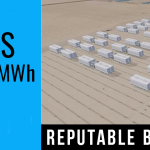
Google and other large tech companies are seeking to add cleaner energy to power their operations, but the new deal stands out for its size and the associated storage, which analysts say is less common in similar corporate arrangements.
While NV Energy already has plans to add both solar and storage to its system, Google is seeking to match up all of its consumption with renewables around the clock.
In December, regulators approved NV Energy’s Integrated Resource Plan, including three solar projects totaling 1,190 MW and 590 MW of energy storage capacity. The utility has indicated it will need to update its long-term plan in order to gain approval for the new deal with Google.
Regulators have scheduled a pre-hearing conference for Jan. 23 to begin considering the proposal.
While Google’s renewable energy purchases in the United States have so far been largely wind driven, the company last year said the declining cost of solar “has made harnessing the sun increasingly cost-effective.”
Solar costs have declined more than 80% in the last decade, according to the company.
In the deals announced last year, Google laid out plans to purchase solar energy from a 155 MW project in North Carolina, 75 MW in South Carolina and 490 MW in Texas. The company said those deals would more than double the capacity of its global solar portfolio.
Clean energy is gaining traction with corporate buyers. Wood MacKenzie estimates that in 2018 corporate deals accounted for 22% of wind and solar contracts, with tech giants topping the list of buyers. The firm said Facebook, Google and Amazon accounted for more than a third of the U.S. renewables market in 2018.
But while the trend is towards more corporate renewables deals, this particular transaction stands out. “This is definitely the largest storage [power purchase agreement] I’ve seen,” Alex Eller, senior research analyst at Navigant, told Utility Dive. “It’s an interesting one.”
Storage deals for corporate buyers often don’t pencil out, said Eller, because the renewable generation is already fairly cheap. “There are some other renewable procurements in this size range, but having storage to go along with it is different,” he said.





